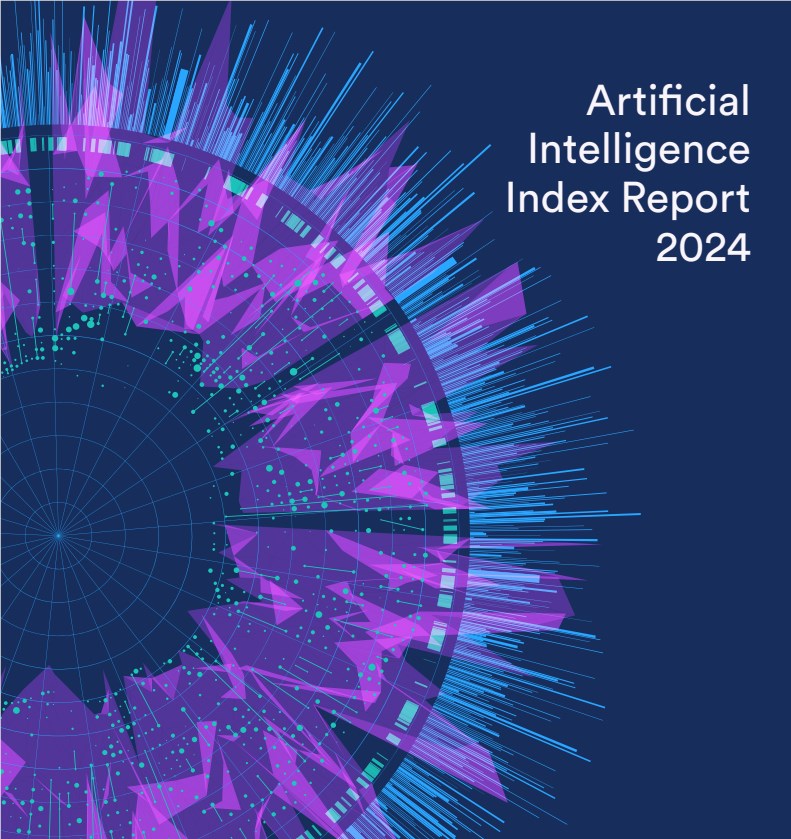StanfordUniversityAIThe Institute's 2024 Artificial Intelligence Index Report provides a comprehensive analysis of progress in the field of artificial intelligence in 2023, covering multiple aspects such as technological progress, economic impact, policy making and public opinion. Here are some key points of the report:

Technological Advances:
Industry research contributions: Industry plays a major role in AI research, contributing 51 significant machine learning models in 2023, compared to just 15 from academia.
Growth of base models: 149 base models were released in 2023, more than twice as many as in 2022, of which 65.7% were open source.
Rising model training costs: For example, OpenAI's GPT-4 and Google's Gemini Ultra cost as much as $78 million and $191 million to train, respectively.
Developments in multimodal AI: New models such as Google’s Gemini and OpenAI’s GPT-4 are able to process multiple modalities such as images, text, and audio.
New benchmarks: Researchers develop more challenging benchmarks to evaluate the performance of AI models on more complex tasks.
Economic impact:
Generative AI investment grows: While overall AI private investment declined, investment in generative AI grew to $25.2 billion.
The United States leads in AI investment: In 2023, the United States' AI investment will reach US$67.2 billion, 8.7 times the amount invested by China.
Demand for AI jobs has declined: Demand for AI-related jobs has decreased both in the United States and globally.
AI improves work efficiency: Studies have shown that AI can improve the efficiency and quality of employees' work.
Fortune 500 companies focus on AI: In 2023, approximately 80% of Fortune 500 companies mentioned AI in their earnings calls.
Policy Development:
Increase in U.S. AI regulations: In 2023, the United States passed 25 AI-related regulations, more than double the number in 2016.
The US and Europe advance AI policies: The EU reached an agreement on an AI bill, and US President Biden signed an executive order on AI.
Global policy attention on AI: By 2023, the number of references to AI in legislative proceedings around the world will almost double.
Public opinion:
Public perception of the impact of AI: 66% respondents believe that AI will greatly impact their lives in the next three to five years.
Western countries’ views on AI improve: Despite concerns, positive attitudes toward AI products and services have increased.
Pessimistic views on the economic impact of AI: Only 371 TP3T respondents believe that AI will improve their jobs.
Different groups of people have different levels of optimism about AI: Younger generations are more optimistic about the potential of AI to improve their lives.
ChatGPT is widely known: 63% respondents are aware of ChatGPT, and about half use it at least once a week.
Other key findings:
AI advances in science and medicine: AI models are being used to accelerate drug discovery, improve weather forecasts, and create a more accurate map of the human genome.
Lack of standardization in responsible AI assessments: AI developers use different benchmarks to assess the liability risks of their models, making it difficult to compare.
The political deepfake problem: Deepfakes, which are easy to generate and difficult to detect, have raised concerns about the potential for AI to influence elections and the political process.
Carbon emissions from AI model training: AI model training generates a large amount of carbon emissions, which has aroused concerns about the sustainability of AI.
This report provides us with a comprehensive perspective to understand the application of artificial intelligence in various fields.up to dateDevelopment and impact. As AI technology continues to advance and be applied, we can foresee that it will continue to profoundly change the way we work and live. At the same time, the report also emphasizes the need to pay attention to the ethics, responsibilities and social impact of AI to ensure that its development can benefit all mankind.
Detailed report content: https://aiindex.stanford.edu/wp-content/uploads/2024/04/HAI_AI-Index-Report-2024.pdf